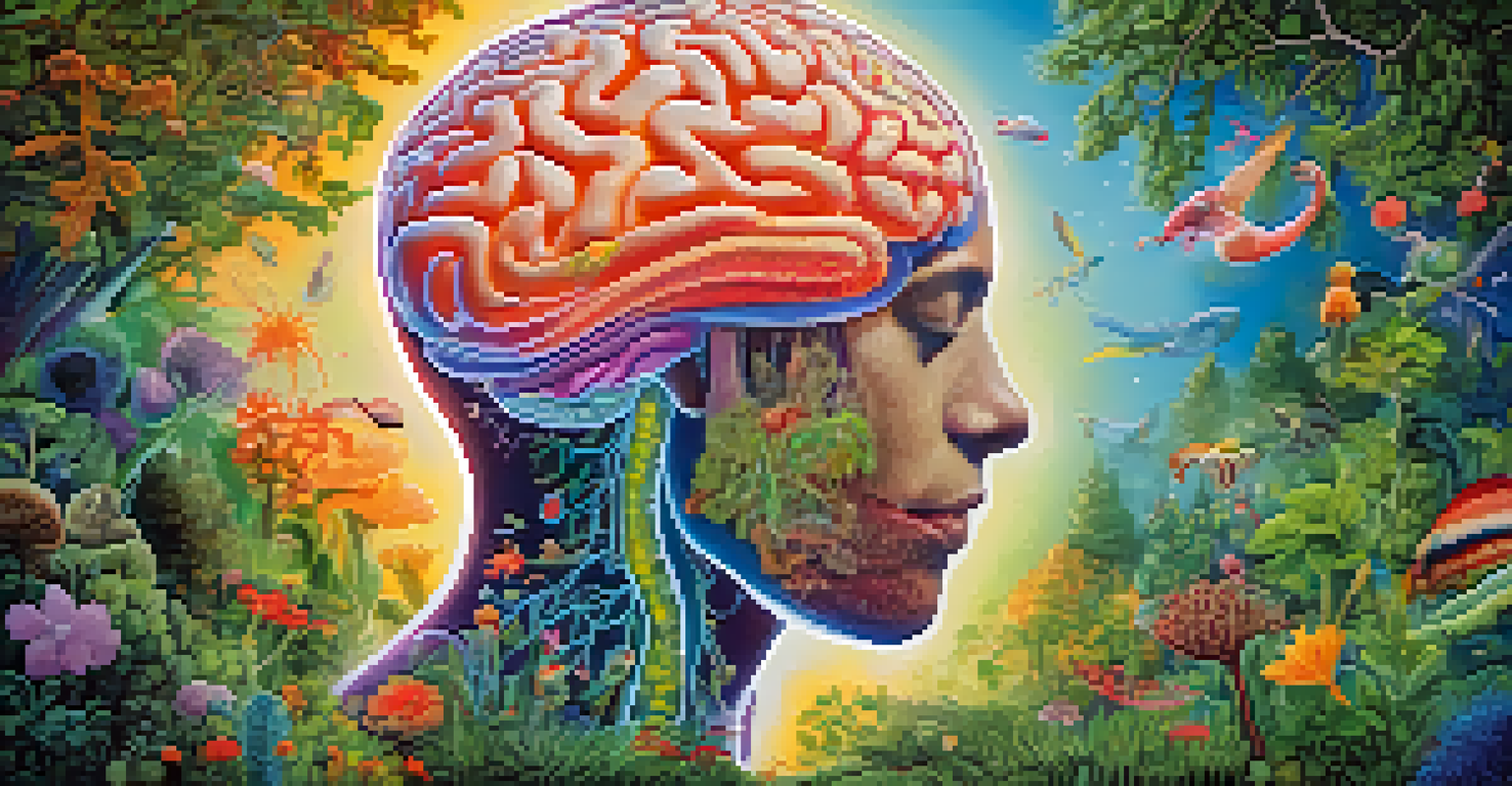Gut Health: Its Role in Addiction and Nutritional Balance

What Is Gut Health and Why It Matters
Gut health refers to the balance of microorganisms living in your digestive tract. This balance plays a crucial role in digestion and overall well-being. When your gut is healthy, it can effectively absorb nutrients and support immune function, making it vital for everyone.
All disease begins in the gut.
An unhealthy gut can lead to a myriad of issues, including digestive problems, fatigue, and even mental health challenges. Think of your gut as a garden; if it's well-tended, it flourishes, but if neglected, weeds and pests can take over. Maintaining that balance is essential for holistic health.
Understanding gut health also involves recognizing its connection to other bodily systems. For instance, a thriving gut microbiome can impact your mood and energy levels, showcasing just how interconnected our body functions truly are.
The Gut-Brain Connection Explained
The gut-brain connection is a fascinating aspect of health that highlights how our digestive system communicates with our brain. This connection explains why gut health can influence mood and behavior, playing a significant role in mental wellness. When our gut is off balance, it can lead to feelings of anxiety or depression.

Research shows that the gut produces neurotransmitters, like serotonin, which directly affect our mood. Imagine your gut as a factory producing essential chemicals; if the factory is running poorly, the entire operation suffers. A healthy gut can lead to improved mental clarity and emotional stability.
Gut Health Affects Overall Wellness
A balanced gut microbiome is crucial for digestion, immune function, and even mental health.
Thus, maintaining a balanced gut microbiome is essential not just for physical health but also for mental well-being. This connection underscores the importance of nurturing our gut through proper nutrition and lifestyle choices.
Addiction and Gut Health: The Surprising Link
Recent studies suggest a compelling link between gut health and addiction. An imbalanced gut microbiome may influence the brain's reward pathways, potentially increasing susceptibility to addictive behaviors. This means that what we eat and how we care for our gut can impact addiction risk.
The gut is a second brain.
For instance, foods high in sugar and unhealthy fats can harm gut bacteria, leading to cravings for more unhealthy foods or substances. It's like a vicious cycle: poor nutrition can lead to poor gut health, which in turn can fuel addiction. Understanding this relationship sheds light on new approaches to addiction treatment.
By focusing on improving gut health, individuals struggling with addiction may find enhanced recovery paths. This could involve dietary changes aimed at restoring gut balance, ultimately supporting a healthier lifestyle.
Nutritional Balance: Feeding Your Gut Right
To support gut health, it’s essential to consume a balanced diet rich in fiber, fermented foods, and a variety of nutrients. Foods like yogurt, kefir, and sauerkraut contain probiotics that can help restore gut flora. Think of these foods as the helpful allies in your gut’s quest for balance.
Incorporating plenty of fruits, vegetables, and whole grains also contributes to a healthy gut, as they provide prebiotics, which feed beneficial bacteria. Imagine prebiotics as the fertilizer that helps your gut garden thrive, promoting a diverse and healthy microbiome.
Stress Impacts Gut Function
Chronic stress can disrupt gut health, creating a cycle of digestive issues and increased anxiety.
Maintaining nutritional balance not only supports gut health but also enhances overall well-being. This holistic approach can lead to improved mood, energy levels, and resilience against addiction.
The Role of Stress in Gut Health
Stress can have a significant impact on gut health, often leading to digestive issues and imbalances in gut bacteria. When we experience stress, our body releases hormones that can disrupt the gut's natural rhythms. Picture stress as a storm that can uproot the delicate plants in your gut garden.
Chronic stress can exacerbate gut-related problems, creating a cycle where poor gut health leads to increased stress levels. This highlights the importance of managing stress through mindfulness, exercise, and relaxation techniques. By doing so, we can create a healthier environment for our gut.
Addressing stress not only improves gut health but also enhances our ability to cope with challenges, including addiction. This connection emphasizes the need for a comprehensive approach to health that considers both physical and mental aspects.
How to Support Your Gut Health Daily
Supporting your gut health can be easily integrated into your daily routine. Start by including a variety of fiber-rich foods in your diet, such as fruits, vegetables, and whole grains. These foods act like a buffet for your gut bacteria, ensuring they have the nutrients they need to thrive.
Additionally, consider incorporating fermented foods and drinks, which can introduce beneficial probiotics to your system. Simple changes, like opting for yogurt instead of sugary snacks, can make a significant difference in your gut health over time. Think of it as a small investment in your long-term wellness.
Nutrition Supports Gut Balance
A diet rich in fiber and probiotics is essential for maintaining a healthy gut microbiome.
Finally, staying hydrated and managing stress levels are crucial for maintaining gut health. By prioritizing these habits, you create a supportive environment for your gut, which can have a positive ripple effect on your overall health.
Consulting Professionals for Gut Health Guidance
While many gut health practices can be adopted independently, consulting healthcare professionals is vital for personalized guidance. Nutritionists and dietitians can provide tailored advice based on your unique health needs and goals. It’s like having a GPS for your health journey, helping you navigate toward better gut health.
Therapists and counselors can also offer support, especially for those dealing with addiction or stress-related issues. They can help address underlying emotional challenges that may impact both gut health and overall well-being. Combining nutritional and psychological support creates a holistic approach to health.

Remember, every body is different, so what works for one person may not work for another. Seeking professional advice helps ensure that your journey toward gut health is both effective and safe.